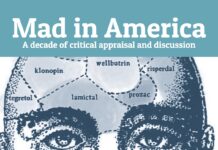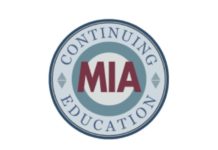The Mad in America Continuing Education Project is continuing to evolve. Earlier this year, we initiated a new way of providing our courses—a webinar format which has been going over quite well. Over 200 people took Dr. Chris Gordon and Keegan Arcure’s live course on Open Dialogue, and the numbers have continued to grow as people watch the webinar after the fact. So we have decided to ramp up our webinar operation. We have produced two more webinars so far: one on Oregon’s early psychosis intervention program, EASA (Early Assessment and Support Alliance), and another with Denmark’s Olga Runciman speaking on withdrawing from antipsychotic drugs.
The response has been so positive that we are going all-in on producing webinars. On September 12th, Dr. Marilyn Wedge and Dr. Gretchen Lefever Watson, two pioneering and internationally known psychologists, will share their extensive clinical work and research on interventions for children labeled with ADHD. This webinar will challenge conventional beliefs about the effectiveness of drug treatment and offer safer and more effective interventions—educational, family and nutritional approaches. We still have slots open so please consider getting in on this important educational offering. (1 CEU is available for psychologists, social workers, licensed professional counselors, marriage and family therapists, and nurses.)
In October we will move to the “next level” with a series of courses to review a topic that has never received full and complete coverage: withdrawal from psychiatric drugs. This series will build on Olga Runciman’s well-received webinar and it will become available on a monthly schedule starting this fall. The initial series will look at the history of the psychiatric med withdrawal movement, with notables such as Carina Hakansson, Dr. Sandy Steingard, Dr. Kelly Brogan and Dr. Peter Breggin looking at the knowledge and support base for medication withdrawal that has arisen from the grassroots in the absence of research or support from the mainstream. The next series will look in depth at the research, knowledge, and changing landscape that now supports med withdrawal.
One important component of our webinar courses will be the lived experience of people who have withdrawn (or attempted to withdraw) from psych medications. The series will begin and end with panels that will lay out what is to be learned, and what has been. Internationally known psychiatrists, along with experts by experience, will present both the academic research and the user-led knowledge base that provides the clinical, medical AND experiential foundation for this process—with the acknowledgment that we are at the very beginning of learning about this topic of critical concern.
The pharmaceutical industry has long funded CEU and CME curriculums, with the predictable result that the knowledge base, where it exists at all, is tainted by commercial interest. Professionals receive most—if not all—of their required ongoing education from these biased sources, because they are provided for free. At MIACE we have steadfastly refused all commercial or institutional sources of funding. Therefore, we are charging a very small fee for our webinars, which is what helps us to provide these independent CEU online webinars. It is difficult to compete with biased information when it is offered for free.
Everyone I have talked to says that what we offer is simply not available anywhere else. Confirming our role in providing information is the reference to us in the resource guide section of Art Levine’s new book, Mental Health Inc.—it’s great to see that we’re making the national scene. We have a critical vacuum to fill, and we intend to keep doing so until the field is fully saturated with unbiased professional education.















Good luck, Robert! When you get on the subject of attachment theory and how it works in adult relationships to heal the worst of the worst cases of mental health issues and ‘extreme states’ sign me up!
Report comment
sounds really really good…
I have a problem with charging a fee…
I believe that attempts to get at the truth should be available to all…for free
Report comment
The fee has got to be a real problem for some folks here who aren’t A. mental health professionals, or B. ex-patient mental health professionals, or C. stumbled onto the site completely by accident, poverty being endemic to some peoples’ life situations, such as, victims of mental health interventions.
I’m curious about Olga’s course. There is a great of need for education on the subject. There is also a great need, given the damage caused by psych-drugs, for support groups to help people get off these substances, especially the neuroleptics, that are, unfortunately in lieu of the facts, misleadingly billed as beneficial.
Although I wouldn’t expect it, still, it would be great to see an MIA course on anti-psychiatry, too. That kind of thing might even get me to pay the fee.
There is an antidote to the mental health system, and that antidote is fun. (Some say “love”, or “Louvre”, if they’re snobby.) Of course it’s a problem. When people aren’t having fun, you call a doctor. Certainly, that’s no fun either. Not unless the doctor is a clown doctor. Anyway, just think about it. You can change all that. We are on the verge of a revolution away from excessive seriousness and towards excessive clowning. Should be fun.
Report comment
Is there a possibility of offering the courses to non-professionals without a fee and only charge for the CEU credits? The info on psych drug withdrawal seems an especially important topic to reach as many of the folks who are suffering and have no other support as you can. Keep in mind that many folks have to taper themselves down without any medical support because they can’t risk the very real possibility that their prescriber could freak out and strip their liberties, and that those who have been compromised the most by the drugs are often on fixed income at the poverty level (disability payments) and cannot afford to pay.
Report comment
Not to sound like a broken record but I highly recommend the Surviving Antidepressants site for support regarding tapering off of many psych meds, and not just antidepressants. It is not beholden to any commercial interest.
http://survivingantidepressants.org/
Report comment
I won’t be taking any MIA continuing Ed classes until I see survivor-taught classes. I am sooooo tired of the assumption that MH professionals are the experts. I offered to teach a madness memoir class and that was turned down. I asked about someone (a mathematician, hopefully a survivor) teaching a statistics class, or rather, on how to interpret statistics in “studies.”…I have not received a response on that. I have NO interest in taking a class that assumes these MH “professionals” who have the audacity to claim they know better.
Report comment
I’d love to see something besides stuff about pills, pills, pills on here. There’s more to the mental system than that.
Report comment
I’m GLAD GLAD GLAD they’re talking about pills pills pills!
Blah blah blah blah….
Report comment
Then you can stay right here. Those of us who want to discuss incarceration, gaslighting, forced unemployment, and restraints will take our business where they care about such things.
Report comment